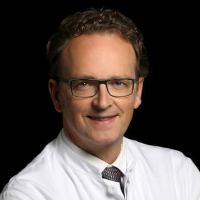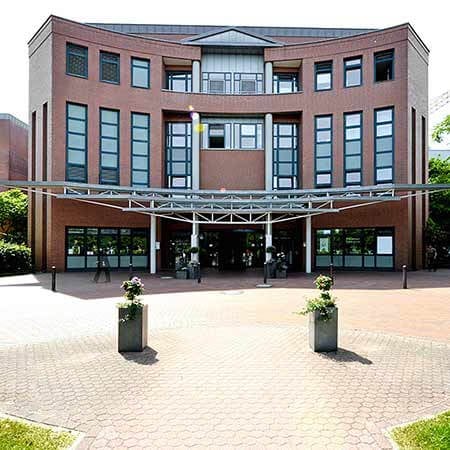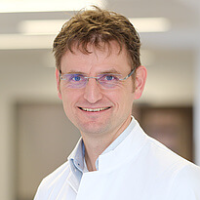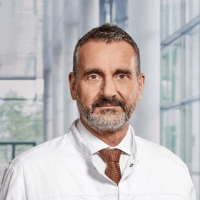Surgical Correction of Total Anomalous Pulmonary Venous Connection in Germany
Treatment prices are regulated by national law of the corresponding countries, but can also include additional hospital coefficients. In order to receive the individual cost calculation, please send us the request and medical records.

Department of Cardiothoracic Surgery
According to the Focus magazine, the Department of Cardiothoracic Surgery ranks among the top German medical facilities specializing in the surgical treatment of diseases of the cardiovascular system and lung cancer! The department offers the full range of surgical services for the treatment of diseases of the cardiovascular system, respiratory tract, including heart and lung transplantation, artificial heart implantation. The therapeutic options include aortic surgery, coronary artery bypass grafting, transplantation surgery, surgical treatment of heart rhythm disorders (arrhythmias), minimally invasive surgery, surgical treatment of the heart valves, including reconstructive interventions. All operations are performed using state-of-the-art technology and in accordance with the current recommendations of professional societies.






Department of Cardiac Surgery
The Department of Cardiac Surgery provides a full range of surgical treatment in its area of specialization. Special emphasis is placed on heart valve repair and replacement surgery, coronary artery bypass grafting, thoracic aortic surgery, adult congenital and acquired heart disease surgery, pacemaker and defibrillator implantation, and artificial heart implantation for severe heart failure. Many heart operations are performed using minimally invasive techniques, which has a positive effect on the healing of the surgical wound. Minimally invasive cardiac procedures also reduce surgical risks and contribute to a rapid recovery of the patient in the postoperative period. Surgical treatment of cardiac pathologies is performed in advanced operating rooms equipped with the latest technology. The cardiac surgeons of the department successfully perform routine and complex surgical procedures, saving the lives of thousands of patients. The specialists work in accordance with current clinical protocols and follow the recommendations of the German Society for Thoracic and Cardiovascular Surgery (DGTHG).


Department of Cardiothoracic Surgery and Vascular Surgery
The Department of Cardiothoracic Surgery and Vascular Surgery provides effective surgical treatment for diseases of the heart, respiratory system, and blood vessels. The team of cardiac surgeons operates on patients with heart valve pathologies, coronary heart disease, heart failure, and heart rhythm disturbances. In the field of thoracic surgery, the key focus is on the surgical removal of lung tumors and lung metastases. The specialists in this area also perform surgery to repair chest wall deformities. In the field of vascular surgery, interventions for abdominal and thoracic aortic aneurysms are most often performed here. The department's vascular surgeons are also exceptionally competent in the treatment of peripheral occlusive arterial disease. A great advantage for the department's patients is that almost all surgical interventions are performed using minimally invasive techniques, so there is no need for a long postoperative recovery. The department's operating rooms are equipped with state-of-the-art technology. This allows for effective and safe treatment. The priority is always personalized medical care for patients.






A total anomalous pulmonary venous connection is a critical heart disease. The condition requires treatment in the first months of a child's life. You can undergo your treatment in Germany and count on a complete cure for the disease without any health consequences. You can find the cost of treatment in Germany and choose a medical care program at the best price on the Booking Health website.
Content
- What is a total anomalous connection?
- Treatment principles for a total anomalous pulmonary venous connection
- Methods of correcting total anomalous pulmonary venous connections
- Surgical outcomes for a total anomalous pulmonary venous connection
- Where to have treatment for your total anomalous pulmonary venous connection?
What is a total anomalous connection?
A total anomalous pulmonary venous connection means that the pulmonary veins do not open where they should. Normally, they carry blood from the lungs to the left atrium, that is, to the arterial part of the heart. If a pathological connection occurs, they will open into the cavity of the heart or blood vessels that contain venous blood.
As a result, a situation arises in which oxygen-rich blood cannot enter the systemic circulation and instead returns back to the lungs.
In children, immediately after birth, the ductus arteriosus remains open, and there is also communication between the atria. As long as they remain open, a small amount of arterial blood can enter the systemic circulation. However, when these communications are closed, the patient's condition becomes critical.
Treatment principles for a total anomalous pulmonary venous connection
A total anomalous pulmonary venous connection requires surgical treatment in a short time. If left untreated, mortality during the first year of life reaches 80%.
The following operations to treat the disease can be performed:
- radical surgery is the treatment aimed at repairing the defect and restoring normal hemodynamics;
- palliative surgery is the treatment that helps to temporarily stabilize the patient's condition so that it can be followed by a radical correction of the defect.
The preservation of hemodynamics in patients with a total anomalous pulmonary venous connection depends on whether any communication between the atria is maintained. This is the main route by which arterial blood enters the systemic circulation to oxygenate organs and tissues. Palliative treatment therefore increases the opening between the atria. This is done through a procedure called a balloon atrial septostomy. This is a type of minimally invasive treatment. Doctors deliver the balloon to the area between the atria through an incision in the groin and inflate it with saline. The balloon expands and enlarges the atrial defect.
Radical correction is performed during an open intervention. The purpose of this operation is to reconnect the pulmonary veins so that they deliver blood from the lungs to the left side of the heart.
Methods of correcting total anomalous pulmonary venous connections
Doctors use different types of interventions to repair total anomalous pulmonary venous connections as the types of malformation vary. In different patients, the pulmonary veins connect to different systemic veins and heart chambers. In addition, concomitant anomalies in the structure of the heart and large vessels are often encountered, and these problems also need to be solved during the surgical intervention.
In the first and third types of the defect, an anastomosis is applied between the left atrium and the pulmonary vein collector during the operation. The area of the anastomosis should not exceed the area of the atrioventricular orifice. Many patients have atrial septal defects, or they are caused by doctors. The defect is eliminated with a patch during the surgical procedure.
For type 2 defects, the correction is easier. The pulmonary vein ostia is usually wide. It is simply transferred from the right atrium to the left, with a simultaneous plastic repair of a septal defect between the atria. In the case of veins connecting to the coronary sinus, the VanPraaghc modification is applied.
Surgical repair of the infracardiac form of the defect is considered technically complex when the pulmonary veins open into the vena cava or other blood vessels below the diaphragm. They are far from the heart. As a result, they cannot simply be reconnected, so the doctors have to perform a reconstructive stage.
Although most interventions for a total anomalous pulmonary venous connection are performed through an open sternotomy approach, minimally invasive endoscopic operations using the da Vinci surgical system have begun to be performed at leading German hospitals in recent years. They are made through several incisions between the ribs. Such operations are safer, blood loss is reduced, and a patient recovers faster after surgical treatment.
Surgical outcomes for a total anomalous pulmonary venous connection
In the 20th century, the mortality rate for operations to repair total anomalous pulmonary venous connections reached 25%, but today it has decreased to an average of 6%. The mortality rate of patients is several times lower at leading hospitals in Germany. The best results can be achieved through a radical correction at the age of up to 3 years.
Lethal outcomes are usually caused by initially severe conditions in patients, such as pulmonary hypertension and low blood oxygen saturation. Hypoplasia (small size) of the left heart and an infracardiac anomalous pulmonary venous connection are also considered poor prognostic factors.
In Germany, the vast majority of operations are successful. Patients fully recover after surgery. Hemodynamic parameters normalize within a few months. Within a year, most of those who have been operated on do not have any symptoms.
The complications following the surgical treatment of anomalous pulmonary venous drainage at hospitals in Germany are rare. Pulmonary vein stenosis (narrowing) is the main one. It can, however, be eliminated with a minimally invasive procedure called balloon angioplasty. In Germany, this procedure is performed through an incision in the groin. Complications may develop in only a few patients. Most of those operated on will not need any surgery or minimally invasive procedures for congenital heart disease, even in the distant future.
Where to have treatment for your total anomalous pulmonary venous connection?
You can get help by seeking medical attention at one of the Cardiac Surgery Hospitals in Germany to undergo a surgical repair of the heart defect. You are welcome to use the Booking Health service to find out the cost of treatment in Germany, compare prices, and choose a medical care program at a favorable price.
There are a few reasons for you to undergo your treatment in Germany. These are the following:
- advanced medicine;
- highly qualified cardiac surgeons with high authority not only in Germany, but also far beyond its borders;
- modern, well-equipped Departments of Cardiac Surgery;
- successful operations on patients of any age, including newborns;
- palliative interventions are performed using minimally invasive endovascular techniques;
- the best Cardiac Surgery Centers offer robot-assisted operations;
- a low mortality rate and a low risk of complications;
- reliable results that last for life.
When you select a medical care program through Booking Health, the cost of treatment in Germany will be lower. Prices for treatment in Germany will be reduced due to the absence of taxes for foreign patients. The initial cost of treatment in Germany will not increase because you will be insured against unforeseen medical expenses.
The Booking Health specialists will provide you with services for organizing your trip abroad. We will help you select a hospital in Germany, contact its administration, and schedule an appointment on your preferred dates. We will also book a hotel room and airline tickets, meet you at the airport, and take you to the hospital by car. You will benefit from support and assistance in solving any organizational issues during the entire period of your treatment in Germany. After the completion of your treatment in Germany, we will take care of your transfer from the hospital to the airport. We will provide you with the opportunity to receive medical consultations within 3 months upon the completion of your medical care program. We will also buy medicines in Germany and forward them to your native country, if necessary.
Authors:
The article was edited by medical experts, board-certified doctors Dr. Nadezhda Ivanisova and Dr. Vadim Zhiliuk. For the treatment of the conditions referred to in the article, you must consult a doctor; the information in the article is not intended for self-medication!
Sources:
ECR - European Cardiology Review

